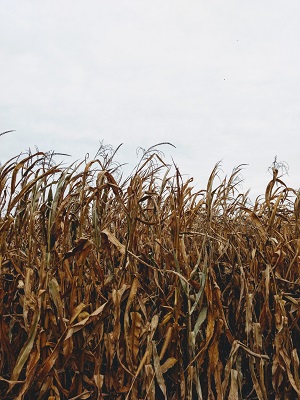You have no items in your cart. Want to get some nice things?
Go shopping
Somewhere in Indiana, Ellen says, “Do you know what these fields are?”
You look out the window and say, “That’s corn.”
“They don’t look like cornfields.”
You gaze at them zipping by and say, “Well it’s autumn.” Ellen looks at you with that little crease forming between her eyes. You know she’d normally understand, but it’s been a long day, driving through four states. So you say, “It’s autumn. The corn’s been harvested, and that’s what’s left of the stalks.”
“Oh,” she says. She smacks her forehead. “I guess I always just imagined them picking them off the stalks and leaving them there to grow another ear of corn.”
“Yeah, that makes sense if you’ve never seen it harvested,” you say. “Have you ever been outside of Los Angeles before?”
“Of course,” she waves a hand. “When I was a kid, we used to fly up to San Francisco every summer to escape the heat in August.”
She makes it sound like traveling to San Francisco from Los Angeles is like going to Mongolia or Turkey, and that makes you smile. This is a woman who will never get you, not fully, and on this trip through the country, which was meant as a test to see how compatible you were, you decided somewhere in the middle of Missouri that either she wasn’t right for you or you weren’t right for her and since the Illinois-Indiana border, you’ve been wondering how you should break up with her and when. You’re not sure how you’re going to do it yet, but you know the when of it at least well enough to know that it’s going to be after the trip is done.
“You don’t have to laugh at me,” Ellen says.
“I’m not laughing at you. I’m charmed by you.”
“I like that, I suppose.” You’ve lived in Los Angeles since you were a teenager, but you know that the truth is that you’re still a Midwesterner. You always loved California, but you were never a Californian. “What do they do?” she asks. “Do they just pull them out by the roots?”
“I mean corn is just a type of grass, and they more or less just mow it with big tractors. I don’t know enough about farming to know if they have to replant or it reseeds itself or what.”
Ellen watches the landscape for a while, her head turned away from you. You turned off the radio, and the only thing you hear is the music of the anxiety of your thoughts. You have no desire to hurt this woman. You like her. It’s just that you have no desire to live with her either. You’re inside the gloomy world of your head for miles when she turns to you and says, “We have an expiration date, don’t we?”
You take your eyes off the road to face her for a long silent moment, and then you both laugh together. “I was going to save that question until we were done with the trip,” you say.
“It’s all right,” she says. “Not everything has to last forever for it to be good.”
“That’s right,” you say. “So much is temporary, and most of it’s good.”
Except that’s wrong, you understand. The truth is that everything is temporary. Everything is mowed down in the end. There’s something about Ellen even though she’s not right for you, so you take her hand, and she lets you. You drive through the Indiana twilight and are for this moment perfectly content.
John Brantingham
John Brantingham was Sequoia and Kings Canyon National Parks’ first poet laureate. His work has been featured in hundreds of magazines, Writers Almanac and The Best Small Fictions 2016 and 2022. He has nineteen books of poetry, nonfiction, and fiction including Life: Orange to Pear, Kitkitdizzi, and Days of Recent Divorce. He is the founder and general editor of The Journal of Radical Wonder. He lives in Jamestown, NY.




